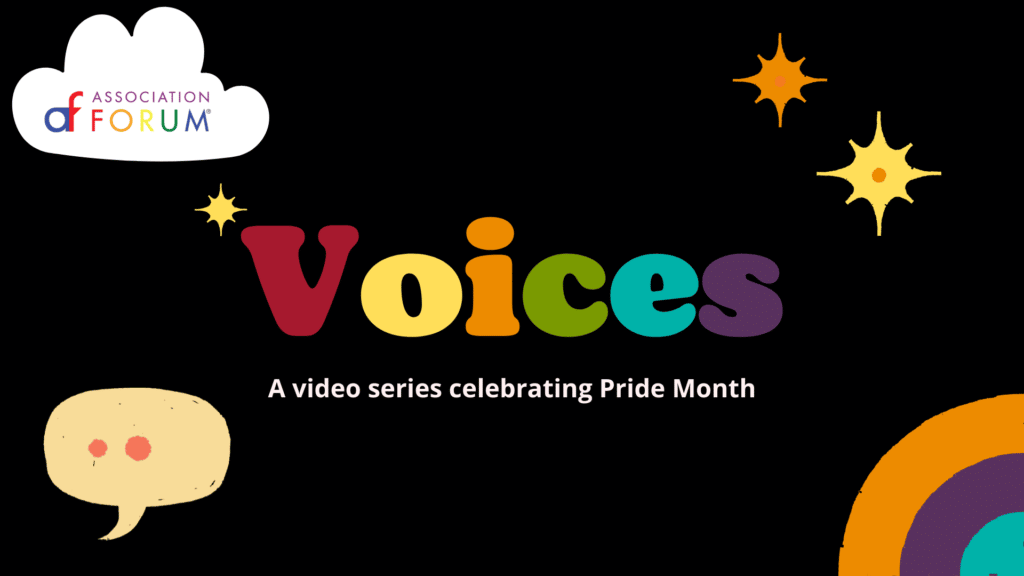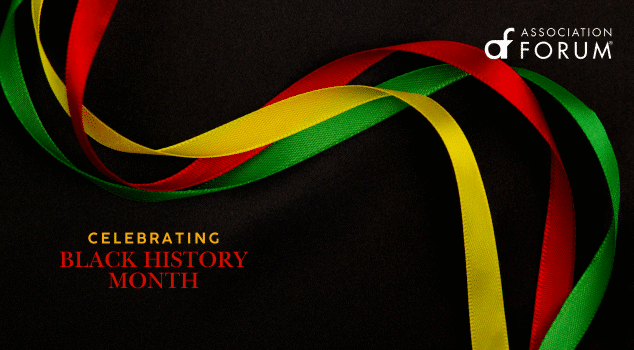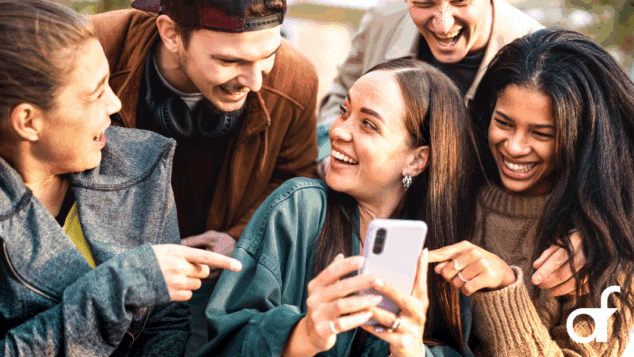VOICES: Zack Wahlquist Shares What Pride Month Means to Him

Association Forum’s LGBTQ+ Advisory Group presents a series of videos to celebrate and reflect upon Pride Month. Over the course of the month, we’ll speak with members of the association community and ask them what Pride Month means to them. In this video, Association Forum CEO Artesha Moore sits down with Zack Wahlquist, Chief Operating Officer for the Chicago Association of Realtors. Stay tuned throughout the month and check back for more videos in the series VOICES.
Below is a transcript of the conversation:
Artesha Moore: Hello, everyone. I’m Artesha Moore, and I’m President and CEO of Association Forum. Today, I have the pleasure of introducing and interviewing one of my friends, Zack Wahlquist. So I’ll ask Zack to introduce yourself.
Zack Wahlquist: Thanks, Artesha. Hi everyone. My name is Zack Wahlquist. I am the Chief Operating Officer at the Chicago Association of Realtors, and I have been in my role here since December of 2019. I am also the co-chair of the LGBTQI+ Advisory Group for Association Forum, which is a group I am really thrilled to be involved with. So thanks for having me today, it’s so fun to get to chat with you.
Artesha Moore: As we’ve done throughout the year in video series, we are here today to celebrate Pride, so happy Pride.
Zack Wahlquist: Thank you.
Artesha Moore: Today is the second day of Pride, so happy Pride. Today I’d like to really lean in and talk to you about what this month and what this celebration really means to you. So let’s start there.
Zack Wahlquist: Awesome. So I take the bus into my offices, which are on Michigan Avenue. We’re right by the river, and yesterday on the bus commute in, it was like June exploded everywhere along Michigan Avenue. So everywhere from the T-Mobile store to the Intercontinental Hotel, everyone has Pride flags up and it’s fun to see. In some of my circle of friends, sometimes the idea of the corporatization of Pride comes up and these companies that just put up these signs and these things for Pride month, and there’s a little bit of that just doing some lip service to celebrating Pride month, but the thing that I really love about the visibility and about seeing the things that I see on Michigan Avenue as I come to work is just that visibility piece. I think that Pride month is important because it allows people who don’t always see themselves to understand that they are visible, and there is recognition about LGBTQI identities that is out there.
Zack Wahlquist: It might help somebody say, hey, that store is a safe place, or that place is something that supports my identity, and I might be able to build some courage there. Pride month, to me… Pride started from an activist perspective, so it’s in June because of the riots that occurred at the Stonewall Inn in 1969, and it really started from a place of being frustrated with the level of discrimination that gay and lesbian and trans folks had at that point in time, and so it really started from a place of activism. So, this is a time to reflect on the things that still need to change, and the progress that we’ve been made in seeing change in our society. I think it’s also important to have an aspect of celebration as well, because that visibility is so important, and that being able to say, these are our authentic selves. This is how we show up, and we are all worthy of being celebrated. I think that’s one of the things that makes Pride month so special.
Artesha Moore: I think that’s important. You hit on a number of things. I think the activism, but also the celebration. As an ally, this month also helps me focus where we go deeper in our learning. How do we amplify and support? So I think that yes, there is the corporatization of any heritage month and of Pride, but also from an ally, how do we actively all focus and support each other? Then of course the celebrations. It’s summer in Chicago. It’s the feeling of pride with Pride. So I appreciate that, and then just seeing the rainbows, it’s fantastic. It just feels good.
Zack Wahlquist: Yeah, brings a smile.
Artesha Moore: Yeah, it does. But you know, as an Association executive and as a leader in that, we still struggle in some aspects of not just representation, but true inclusion and equity. So from your perspective, how can the Association industry become more inclusive?
Zack Wahlquist: That’s a really great question. We reflect a lot on that here at CAR, and I do myself as well. Sometimes it’s easy for me, from my perspective, to take for granted the privilege I have of being out, of being able to say, “I’m a gay man, and that’s an okay identity for me to bring to work.” I take that for granted often. So one thing that we can do to make our workplaces more inclusive is to reflect on if that is possible in our work environments. Is it possible for somebody to say I am a trans individual, I am a lesbian, I am gay in our work environment, and bring that person to work? If it’s not, what are the obstacles that we’re not aware of, or aware of that are preventing that from happening? I think another thing that workplaces can do is really reflect on the opportunities they’re giving individuals from underrepresented identity to have their voices heard.
Zack Wahlquist: So be that an LGBTQ identity, be that a different racial or ethnic identity, what are the opportunities we’re giving those folks on our teams and in our membership, the opportunity to be heard, to be involved, to be active, and to help us create change in positive environments? Maybe one last thing to add here, because the LGBTQI+ advisor group has been chatting about this. I know other advisor groups have as well, but this idea of intersectionality, and about where our different identities come together, and what that means about us as people and about our workplaces. This month is actually a really good example. Juneteenth also falls in this month, and now it’s a state holiday in Illinois. So sure, some of us get that day off, but how do we talk about what Juneteenth is as well, and how does that intersect with Pride month, and what can we do to enhance all the conversations by combining them into one voice and one opportunity to speak about them?
Artesha Moore: I think that’s really interesting, and I think it’s important, and that’s where Associations really can walk the talk, but model what it looks like, especially around that intersectionality piece, because I think that as we look at so many beautiful things of the American culture and our story, it is that we aren’t just one thing. Even though right now, the headlines may make it seem that way. We are this beautiful tapestry of all of these things. So the more that the Forum can be a place that we show that and support that, I think it’s important. I think you also bring up something that right now, everyone is feeling a little bit under attack in some ways, because of how polarized things have become. So the more that you and your group and within the Association Forum can show and lean into the leadership that is coming out of all of these beautiful intersections of who we are, the more that others can see themselves in our community and see themselves.
Artesha Moore: I think that’s really important, even at CAR, and what you all are doing in leadership. You’re being very representative of what leadership is. I do have a question that I’m going to just throw an audible right now, because I think that what is it that as a larger group within the Chicago land region, that you all experience in the C-suite that allow for the psychological safety, because that is really important as you are leaders within diversity, equity, and inclusion. How do you all create that psychological safety for your members and your staff?
Zack Wahlquist: I think that comes from leading from a place of vulnerability and a place of authenticity. I only show up as me, and that includes a gay element of my identity. It includes a male aspect of my identity. It includes my history and where I come from, and speaking specifically about the Chicago Association of Realtors, Michelle Mills Clement is our CEO, and she brings herself to work every day. We both try to let our teams know that it’s okay to be authentic, and that we expect to hear about the difficult things that need to be addressed. We expect to have the opportunity to change our culture and change our environment.
Zack Wahlquist: We will only get to do that if we’re vulnerable, and if our staff is vulnerable, and if our members are vulnerable as well. Building DEI, and building the capacity to have those conversations takes time, and it takes a lot of intentionality. I know you know that. It takes being intentional about finding the voices that are missing in conversations, and recruiting to bring those voices in to make our memberships and our staffs more representative of the communities that we serve, whatever identity that might be. I think that at the C-suite level, it’s imperative and it’s our responsibility to make sure those changes happen.
Artesha Moore: Mm-hmm (affirmative). That’s why I look up to you. Even in coming to Chicago in February, I’ve been looking at this group from afar for a long time. The leadership attributes and what you just brought forward in that day-to-day showing up and making space for others made you all champions for me, and I’m excited to be here. So now I’m going to turn the question to you. Who do you admire and look up to? Who are your heroes?
Zack Wahlquist: Oh, that’s a great question. I’m a guy who wears my heart on my sleeve, so forgive me if that comes out here in these moments, but I would have to say, and this is definitely not lip service, but one of the things that brought me here was the opportunity to work with our CEO, Michelle. She’s just such a fantastic advocate, and champion, and ally in all causes. She leads from her heart and she just is giving me so many great opportunities to learn. So definitely she’s one of the folks I looked up to and one of my heroes. From an identity as a gay man, when I was a senior in college, I was sort of out at that point in time, but I had the opportunity to chair the search committee for the new director of the student center at the University of Utah. So I grew up in Utah. I grew up in Salt Lake City, very conservative town. One of the folks that we interviewed was a man named Whit Hollis.
Zack Wahlquist: Hey Whit, if you’re listening, who was from the south, who was unapologetically out and proud and himself, who talked about his partner during the interview process with this group of strangers, and was just in a very formative time for me an example of what it meant to be yourself, and bring your authentic self to every situation that you come to. He gave me the courage to lead from a position of being out and being okay letting people know who I was, and really showed me that the ways that we get to know each other and break down barriers is through storytelling, and through telling the things about ourselves and our journeys that make us unique and learning about everyone else’s journeys along the way, and what commonalities we have or what support we might be able to lend one another to.
Zack Wahlquist: So those two come to mind, really. In the spirit of Pride month, I think back and have read a lot and watched a lot about the Stonewall riots. I think about some of the activists there, like Marsha P. Johnson and others who led the way and just am really grateful that we had folks at critical points in time that were willing to stand up for what they believed in, and start making waves of change that rippled way beyond they did.
Artesha Moore: That’s a beautiful, beautiful sentiment. I think that the folks that you mentioned, and especially Michelle, knowing Michelle, and she’s a member of the Association Forum’s board, I too have been inspired for a long time. I think the other hero is really a message for all of us. As we show up and be our authentic selves, there’s fear in that, but there’s also an opportunity to touch someone that you don’t know in the space. So for those that know me, and Zack you do, I tend to show up authentically, but it’s to show others who may not see themselves in this seat or your seat that there’s place for you too in this leadership thing. So thank you for sharing that, because I think it’s important for all of us to just remember that who we are matters, and showing up can help someone else.
Zack Wahlquist: Absolutely. No one else is us. No one else brings what we bring, and so I believe that truly.
Artesha Moore: That’s great. Well Zack, thank you so much for the short time. I hope that as the folks watch this video, they are seeing that leadership comes in so many different flavors, and at the Association Forum, you have an opportunity to take your leadership to the next level. So, thank you.
Zack Wahlquist: Thank you. Thank you for being who you are, and for bringing yourself to Forum. I’m excited for the future and continuing to be involved, and to get to collaborate with you.
Artesha Moore: Thank you.
Tags
Related Articles
BAE Chicagoland Kicks Off: Join the Movement!
Black Association Executives (BAE) is officially in Chicagoland, bringing a bold new community to Black...
The Weight We Carry: What Teams Wish Leaders Understood
Association professionals are feeling the strain of relentless change—burnout, shifting expectations, and emotional fatigue are...
Workforce to Hit 30% Gen Z by 2030: Ready or Not?
Gen Z isn’t lazy—they’re reshaping work with speed, collaboration, and purpose. Here’s how to engage...





